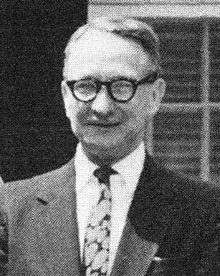Brainard Cheney

Brainard Cheney (June 3, 1900 – January 15, 1990) was a novelist, playwright and essayist from Georgia associated primarily with the literary movement known as the Agrarians.
Biography
Cheney was born in Fitzgerald, located in the wiregrass region of south central Georgia. He moved to Lumber City with his family when he was six years old.[1] He had a writing career that covered four decades. He published four novels — Lightwood (1939), River Rogue (1942), This Is Adam (1958), and Devil's Elbow (1969) — that depict the marring of Agrarian ideals by the social transformation of south Georgia between 1870 and 1960. Ultimately, these novels demonstrate the negative impact of unfettered capitalism, Reconstruction, and northern exploitation on south Georgia.
Cheney attended Vanderbilt University in Nashville, Tennessee and there became friends with many of the Fugitives and Agrarian writers. He took courses under John Crowe Ransom and shared a room with Robert Penn Warren. In 1928, Cheney married Frances Neel, a reference librarian.[2] He and his wife frequently entertained Caroline Gordon and Allen Tate at Idler's Retreat, a large Antebellum house in Smyrna, Tennessee, which Frances had inherited.[2] When they were received into the Roman Catholic Church in 1953, Gordon and Tate were their sponsors.[1]
After Vanderbilt, Cheney became involved in journalism and politics, working for the Nashville Banner from 1925 to 1942, and later as public relations director for Tennessee governor Frank G. Clement from 1952 to 1958.[1] He later penned the governor's address at the 1956 Democratic National Convention ("How long oh Lord, how long..."), as well as assisting Robert Penn Warren with some of the speeches included in his novel, All the King's Men.
Cheney's first novel, Lightwood, dealt with the Dodge Timber Wars that followed the Civil War. These events took place in the current south Georgia counties of Dodge and Telfair, during a period from 1870 through as late as 1923. The associated legal case is considered one of the most complex in recent history, reminiscent of Dickens' book, Bleak House. In 2011, The Lightwood Chronicles, being the true story of Brainard Cheney's novel, Lightwood, was published. The book includes a collection of essays and other information relating to the Wars, divided into two sections: Lightwood as History and Lightwood as Fiction. The editor, Stephen Whigham, interviewed Mr. Cheney in 1982.
Cheney wrote two plays, Strangers in This World, produced at the Vanderbilt University Theater in February 1952 and at the Little Theater, University of Louisville, Belknap Campus, in January 1956, and I Choose to Die, produced at the Vanderbilt University Theater in November 1960.[3]
In August 1952, Cheney wrote an appreciative review of Flannery O'Connor's first novel, Wise Blood.[4] Obtaining Cheney's address from Caroline Gordon, O'Connor wrote to thank him for writing about her book "so carefully and with so much understanding".[5] In his reply, Cheney described himself to the Catholic O'Connor as "an ex-Protestant, ex-agnostic, who had just found his way back (after 10 or 12 generations) to The Church".[6] The Cheneys visited O'Connor for the first time in June 1953. They became close friends with O'Connor and corresponded and shared ideas with her until her death in 1964. Like O'Connor, Cheney was interested in the work of Teilhard de Chardin, about whom in 1965 he co-authored an essay, "Has Teilhard de Chardin Really Joined the Within and Without of Things?", published in The Sewanee Review.[3]
Cheney returned to Georgia in the early 1980s to celebrate a reprinting of his first two novels and the Altamaha R.A.F.T. (Restoring Altamaha Folk Traditions) festival. For the festival, Cheney, who had served as a raft-hand in about 1917,[7] piloted a reconstructed timber raft all the way to the coast at Darien, Georgia. Cheney died in Nashville in 1990 at the age of eighty-nine. His wife died in 1996, also at the age of eighty-nine.
Cheney's novels reveal his desire for a return to a simpler way of life, one founded on natural cycles and rooted in an appreciation of the land. His tragic characters often go astray by attempting to urbanize themselves or betray their own way of life. In his work, redemption can only be achieved by a return to a farm or a religious conversion, as in Devil's Elbow.
In 2011, MMJW BookHouse began republishing Cheney's novels. All four novels are now available in hardcover, softcover and ebook formats.
Works
Novels
- Lightwood (1939). Boston: Houghton Mifflin Co.
- River Rogue (1942). Boston: Houghton Mifflin Co.
- This Is Adam (1958). New York: McDowell, Obolensky.
- Devil's Elbow (1969). New York: Crown Publishers.
Plays
- Strangers in This World (1951)
- I Choose to Die (1960)
Correspondence
- The Correspondence of Flannery O'Connor and the Brainard Cheneys (1986), ed. C. Ralph Stevens. Jackson, MS: University Press of Mississippi.
References
- 1 2 3 Brainard Cheney (1900-1990), The New Georgia Encyclopedia.
- 1 2 Frances Neel Cheney Biography
- 1 2 Brainard Bartwell Cheney Biography
- ↑ Untitled review of Wise Blood in Shenandoah, 3 (Autumn 1952), 55-60. Reprinted in Stevens ed. (1986), Appendix A.
- ↑ Stevens ed. (1986), p. 3.
- ↑ Stevens ed. (1986), p. 4.
- ↑ McGregory, Jerrilyn (1997). Wiregrass Country. Jackson MS: University Press of Mississippi, p. 44.
|